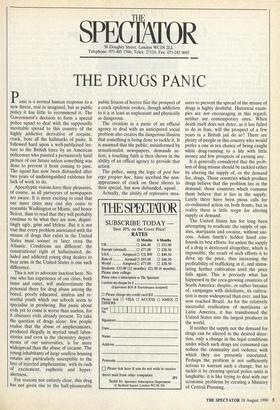THE DRUGS PANIC
Apocalyptic visions have their pleasures, of course, as all purveyors of newspapers are aware. It is more exciting to read that our inner cities may one day come to resemble Washington or Miami, and hence Beirut, than to read that they will probably continue to be what they are now, dispiri- tingly ugly, grim and lifeless. But it is not true that every problem associated with the misuse of drugs that exists in the United States must sooner or later cross the Atlantic. Conditions are different: the constitutional right of hallucinated, de- luded and addicted young drug dealers to bear arms in the United States is one such difference.
This is not to advocate inaction here. No one who has experience of our cities, both inner and outer, will underestimate the potential there for drug abuse among the bored, poorly educated, aimless and re- sentful youth which our schools seem to specialise in producing. But panic about evils yet to come is worse than useless, for it obscures evils already present. To take the question of drugs alone: few people realise that the abuse of amphetamines, produced illegally in myriad small labor- atories and even in the chemistry depart- ments of our universities, is far more widespread than the abuse of cocaine. The young inhabitants of large soulless housing estates are particularly susceptible to the lure of injected amphetamine, with its rush of excitement, euphoria and hyper- alertness.
For reasons not entirely clear, this drug has not given rise to the half-pleasurable public frisson of horror that the prospect of a crack epidemic evokes, though addiction to it is at least as unpleasant and physically as dangerous.
The creation in a panic of an official agency to deal with an anticipated social problem also creates the dangerous illusion that something is being done to tackle it. It is assumed that the public, misinformed by sensationalist newspapers, demands ac- tion; a touching faith is then shown in the ability of an offical agency to provide that action.
The police, using the logic of post hoc ergo propter hoc, have ascribed the non- appearance of crack on these shores to their special, but now disbanded, squad.
Actually, the ability of repressive mea- sures to prevent the spread of the misuse of drugs is highly doubtful. Historical exam- ples are not encouraging in this regard; neither are contemporary ones. When death itself does not deter, as it has failed to do in Iran, will the prospect of a few years in a British jail do so? There are plenty of people in this country who would prefer a one in ten chance of being caught while drug-running to a life with little money and few prospects of earning 'any.
It is generally considered that the prob- lem of drug misuse should be tackled either by altering the supply of, or the demand , for, drugs. Those countries which produce drugs believe that the problem lies in the demand; those countries which consume them believe that it lies in the supply. Lately there have been pious calls for co-ordinated action on both fronts, but in reality there is little scope for altering supply or demand.
The United States has for long been attempting to eradicate the supply of opi- ates, marijuana and cocaine, without suc- cess. Adam Smith's hidden hand con- founds its best efforts: for unless the supply of a drug is destroyed altogether, which is impossible, the result of such efforts is to drive up the price, thus increasing the profitability of trafficking in it, and stimu- lating further cultivation until the price falls again. This is precisely what has happened in the coca-growing countries of South America: despite, or rather because of, campaigns with defoliants, its cultiva- tion is more widespread than ever, and has now reached Brazil. As for the relatively successful eradication of marijuana in Latin America, it has transformed the United States into the largest producer in the world.
If neither the supply nor the demand for drugs can be altered in the desired direc-
tion, only a change in the legal conditions
under which such drugs are consumed can reduce the criminality and violence with
which they are presently associated.
Perhaps the problem is not sufficiently serious to warrant such a change, but to
tackle it by creating special police units is laughable: it is like trying to deal with our economic problems by creating a Ministry of Central Planning.


























































 Previous page
Previous page